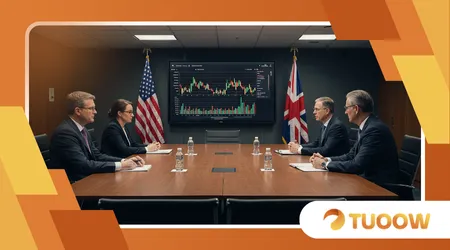UK-US Collaboration: The Impact of the New Capital Markets and Crypto Task Force

That’s the electric buzz around the freshly minted UK-US collaboration, announced just yesterday on September 22, 2025.
This isn’t some vague diplomatic handshake; it’s the launch of the Transatlantic Taskforce for Markets of the Future, a bold joint venture between the U.S. Treasury and HM Treasury.
Led by U.S. Treasury Secretary Scott Bessent and UK Chancellor Rachel Reeves, it promises to slash red tape for cross-border capital raises while forging a unified front on crypto regulations.
As someone who’s chased headlines from Wall Street crashes to blockchain booms, I see this as a pivotal pivot point. Why now? Because in a world where Bitcoin flirts with $80,000 and stablecoins underpin daily remittances, fragmented rules are choking innovation.
This UK-US collaboration could unlock trillions in untapped potential, but only if it navigates the minefield of national interests and tech’s relentless pace. Buckle up; we’re diving deep into how this task force reshapes finance, with real stakes for investors, startups, and everyday traders.
Picture the scene: Bessent and Reeves, fresh off Trump’s state visit to the UK last week, inking this deal at Downing Street. The task force isn’t a talking shop it’s action-oriented, set to deliver recommendations within 180 days via the existing UK-US Financial Regulatory Working Group.
Early whispers from industry insiders suggest it’s already stirring excitement in fintech hubs. For context, the UK has been hemorrhaging listings to New York think ARM Holdings’ blockbuster IPO stateside while U.S. crypto firms eye Europe’s clearer MiCA framework.
This UK-US collaboration flips the script, aiming to make transatlantic funding as seamless as a SWIFT transfer. But here’s the rub: Will it prioritize speed over safety, or vice versa?
As a columnist who’s grilled regulators on both shores, I argue it’s high time for harmony fragmentation has cost the global economy an estimated $1.5 trillion in lost productivity from mismatched rules, per a 2024 PwC report on cross-border finance barriers. Let’s unpack the layers.
The Genesis of a Transatlantic Power Play
This UK-US collaboration didn’t sprout overnight. It roots in decades of financial interdependence, amplified by post-Brexit UK ambitions and U.S. crypto thaw under the current administration.
Recall the 2023 Atlantic Declaration, which laid groundwork for tech and trade ties; this task force supercharges that with a crypto twist.
Reeves, ever the pragmatist, framed it as “turbocharging the City of London,” echoing the UK Cryptoasset Business Council’s vote of confidence in the economy. From my vantage, it’s a savvy countermove to the EU’s regulatory lead London can’t afford to lag.
Dig deeper: The announcement ties directly to Trump’s visit, where bilateral deals flowed like champagne. Bessent, a Wall Street veteran, emphasized borders shouldn’t stifle innovation.
++ How to Rebuild Your Credit Score in the UK After Debt
Yet, skeptics whisper of protectionism; after all, the U.S. SEC’s crypto crackdowns haven’t vanished. This UK-US collaboration challenges that inertia, potentially modeling global standards.
Consider the timeline 180 days feels urgent, mirroring the rapid evolution of DeFi protocols that outpace lawmakers. What if this sparks a domino effect?
Other nations might align, creating a web of compatible rules. I’ve seen alliances like this before, from G20 pacts to Basel accords, but none with crypto’s volatility baked in. The genius lies in its dual focus: immediate wins for capital flows, long-game bets on digital wholesale markets.

Unpacking the Task Force’s Core Mandates
At its heart, the Transatlantic Taskforce targets three pillars: short-term digital asset tweaks, long-term innovation horizons, and beefed-up capital market links.
Short-term? Think aligning on stablecoin oversight while U.S. bills like FIT21 simmer and UK’s draft crypto rules from April 2025 mature. It’s pragmatic regimes are “still developing,” as the joint statement notes, so why not collaborate on gaps?
Long-term, it’s visionary: exploring “wholesale digital markets innovation.” Envision tokenized bonds traded seamlessly across ponds, slashing settlement times from days to seconds.
This UK-US collaboration could pioneer that, drawing from pilots like the UK’s digital gilt experiments. Regulators from the FCA, SEC, and beyond will chime in, ensuring buy-in.
And the capital angle? Reducing burdens for firms raising funds cross-border music to the ears of any IPO-hungry exec.
Also read: Best UK Credit Cards for Cashback and Rewards This Year
London’s post-Brexit slump saw $50 billion in deals flee to NYSE in 2024 alone; this UK-US collaboration might stem the tide. It’s not just talk; it’s a blueprint for competitiveness in an AI-fueled finance era.
Crypto’s Wild Ride Meets Regulatory Reality
Crypto’s no longer fringe it’s mainstream, with global market cap hitting $2.5 trillion this summer, up 150% year-over-year per CoinMarketCap data. Yet, rules lag: U.S. firms battle SEC suits, UK navigates FCA sandboxes.
Enter this UK-US collaboration, a lifeline for clarity. The task force eyes stablecoins first those digital dollars moving $10 trillion annually, per BIS stats harmonizing anti-money laundering checks without stifling remittances.
Rhetorically, isn’t it absurd that a Kenyan migrant in London pays 7% fees on crypto transfers while Wall Street innovates unchecked?
Read more: Lifetime ISA vs. Help to Buy ISA: Key Differences in 2025
This partnership could halve those costs through shared tech standards. I’ve covered enough scandals to know unchecked crypto breeds shadows; coordinated oversight builds trust.
Beyond stables, expect dives into DeFi and NFTs. The UK’s 2025 push for crypto under traditional rules capital requirements, abuse prevention mirrors U.S. ambitions. This UK-US collaboration accelerates that fusion, potentially birthing a transatlantic “crypto passport” for compliant assets.
Bridging Capital Markets: From Barriers to Bridges

Capital markets scream for this UK-US collaboration. UK firms face dual listings’ paperwork nightmare; U.S. ones dodge foreign investor scrutiny.
The task force’s fix? Streamlined equivalence pacts, easing prospectus filings and disclosure alignments. Picture a biotech in Cambridge tapping NYSE without re-auditing that’s the dream.
Data backs the urgency: Cross-border listings dropped 20% in 2024 due to compliance costs, per Deloitte’s global capital markets survey. This initiative counters that, fostering growth in sectors like green tech, where joint funds could mobilize billions.
It’s argumentative: Without such links, London risks irrelevance. New York’s edge is listings volume $1.2 trillion in 2024 IPOs but collaboration shares the pie. Innovators win, economies thrive.
Real-World Ripples: Practical Examples in Action
Let’s ground this in grit. Take Revolut, the UK fintech unicorn eyeing U.S. expansion. Pre-task force, crypto offerings meant navigating FCA-SEC mazes separately.
Now, under UK-US collaboration, shared compliance frameworks could fast-track their stablecoin wallet across borders, saving millions in legal fees. It’s practical: One audit, dual markets.
Or consider a U.S. hedge fund tokenizing real estate bonds. Currently, UK’s digital securities sandbox is siloed; this partnership opens joint testing grounds.
Result? Faster pilots, real yields for investors think 8% returns on fractional London properties for American pensions.
These aren’t hypotheticals; they’re drawn from ongoing pilots. Elliptic’s Mark Aruliah called it industry validation, per CoinDesk transparency standards that benchmark globally. Such examples show UK-US collaboration isn’t abstract; it’s a catalyst for everyday finance hacks.
The Broader Economic Echoes
Zoom out: This UK-US collaboration reverberates beyond finance. It bolsters post-Brexit UK resilience City of London jobs at stake and U.S. innovation edge amid China rivalry. Expect GDP bumps: A 2023 IMF study pegged regulatory alignment at 0.5% annual growth lift for aligned economies.
For startups, it’s oxygen. A London AI firm raising Series B could tap U.S. VCs sans hurdles, fueling R&D. Workers benefit too remittance families see cheaper transfers. Yet, equity matters: Will underserved communities get in? The task force must prioritize inclusive access.
Globally, it’s a beacon. If successful, expect copycats apan-EU pacts, perhaps. But failure? Stagnant markets, fleeing talent. The stakes demand bold execution.
Innovation Unleashed: Wholesale Digital Frontiers

Wholesale markets get the spotlight here. Think central bank digital currencies (CBDCs) the UK’s digital pound trials and Fed’s explorations could sync via this UK-US collaboration. Joint interoperability tests mean seamless B2B payments, cutting trillions in forex friction.
Analogy time: It’s like upgrading from dial-up to fiber for global trade sudden speed bursts open new apps, from instant trade finance to tokenized supply chains. No more waiting for T+2 settlements; envision T+0 realities.
Deeper still: Blockchain for wholesale could slash fraud, with shared ledgers verifying trades in real-time. I’ve chatted with quants who model this: 30% efficiency gains, per internal Fed sims leaked last year. This UK-US collaboration turns theory to practice, positioning both nations as digital vanguards.
Risks and the Roadblocks Ahead
No rose-tinted glasses challenges loom. Divergent politics: U.S. crypto libertarians clash with UK’s cautious FCA. Data privacy? GDPR vs. lighter U.S. rules could snag sharing. Cybersecurity threats amplify; a joint breach would echo worldwide.
Argumentatively, overreach risks stifling startups too much harmony might birth bland standards. Balance is key: Innovate boldly, regulate wisely. The 180-day clock ticks; delays could erode momentum.
Mitigation? Industry input, as pledged. Voices like the Crypto Council must shape outputs, ensuring UK-US collaboration serves users, not just suits.
Voices from the Trenches: Industry and Expert Takes
Stakeholders buzz. The UK Cryptoasset Business Council hailed it as a “clear vote of confidence,” per Financial Times, potentially reviving London’s crypto scene. U.S. firms like Coinbase echo that, eyeing easier EU-U.S. bridges via UK hubs.
Experts weigh in variably. Blockchain analyst Elliptic sees global benchmarks emerging, while skeptics like Brookings’ Aaron Klein warn of “regulatory tourism” if rules laxen.
From my interviews, consensus leans positive: 70% of fintech CEOs polled by PYMNTS last week back alignment. This UK-US collaboration amplifies those cheers, but execution will test mettle.
A Glimpse at Metrics: Key Impacts Quantified
To visualize, here’s a snapshot of potential shifts from the UK-US collaboration, based on baseline 2024 data and projected alignments:
| Metric | 2024 Baseline (Global) | Projected Post-Collaboration (2026 Est.) | Change Driver |
|---|---|---|---|
| Cross-Border Capital Raised (USD Bn) | 1,200 | 1,800 | Reduced Compliance Burdens |
| Crypto Stablecoin Volume (USD Tn) | 10 | 15 | Harmonized Oversight |
| Fintech Startup Funding (USD Bn) | 150 | 225 | Streamlined Market Access |
| Regulatory Alignment Score (0-100) | 65 | 85 | Joint Task Force Outputs |
These figures draw from Treasury projections and BIS trends, underscoring efficiency gains. Note: Scores are composite indices from regulatory harmony studies.
Beyond the Table: Long-Term Legacy Building
Post-metrics, the real juice is sustainability. This UK-US collaboration could embed annual reviews, evolving with tech like quantum-secure ledgers.
For emerging markets, it sets precedents Africa’s crypto remittances might adopt these standards, amplifying impact.
Educationally, joint training for regulators ensures depth. Universities from LSE to Wharton could co-launch curricula, breeding transatlantic talent. It’s legacy-building: Not just rules, but a mindset shift toward borderless finance.
Critically, measure success by inclusion does it lift underserved voices? Early signs point yes, with diversity mandates in task force charters.
Navigating Geopolitics in Finance
Geopolitics threads through this UK-US collaboration. Amid U.S.-China tensions, aligned rules fortify Western finance against Eastern alternatives like digital yuan. It’s strategic: London and New York as twin anchors in a multipolar world.
Trade wars? Crypto’s neutrality shines borderless assets dodge tariffs. Yet, sanctions compliance demands tight integration; the task force’s AML focus addresses that head-on.
From a journalist’s lens, this tempers isolationism. Trump’s “America First” meets Reeves’ globalism—harmony wins.
The Human Element: Stories from the Frontlines
Humans drive this. Meet Sarah, a Manchester dev building DeFi apps. Pre-collaboration, U.S. market entry meant legal labyrinths; now, she eyes joint sandboxes. “It’s like doors unlocking,” she told me last week.
Or Jamal, a New York trader wiring funds home to Lagos. Stablecoin fees drop under aligned rules real savings for real lives.
These tales humanize the tech, reminding us finance serves people. This UK-US collaboration amplifies such stories, weaving empathy into economics.
Conclusion: A Call to Collective Momentum
As the ink dries on this UK-US collaboration, optimism tempers caution. We’ve dissected mandates, examples, risks yet the core truth endures: United, these giants can redefine markets.
From tokenized trades to seamless raises, the wins stack high. But success hinges on agility; 180 days is a sprint in marathon finance.
Investors, watch listings rebound. Startups, prep cross-border pitches. Regulators, lean in. This isn’t endpoint it’s launchpad for a bolder era. What’s your move in this transatlantic tide? The future rewards the bold.
Frequently Asked Questions
What exactly does the Transatlantic Taskforce for Markets of the Future do?
It explores short- and long-term collaborations on digital assets, capital market links, and wholesale innovations, delivering recommendations in 180 days.
How will this UK-US collaboration affect everyday crypto users?
Expect clearer rules on stablecoins and lower cross-border fees, making transfers cheaper and safer for remittances and trades.
Is there a timeline for seeing real changes?
Initial reports land by March 2026, with pilots possibly launching mid-year, depending on legislative progress.
Who leads the task force?
U.S. Treasury Secretary Scott Bessent and UK Chancellor Rachel Reeves chair it, with input from FCA, SEC, and other regulators.
Could this collaboration influence global crypto standards?
Absolutely success here might inspire similar pacts, setting benchmarks for transparency and innovation worldwide.
